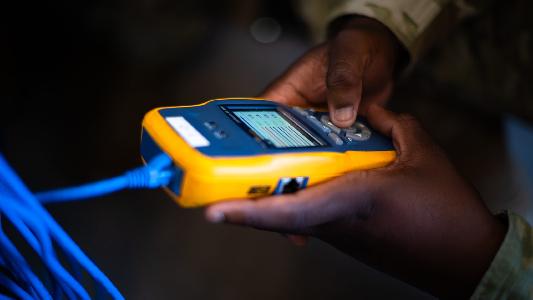When DC Mayor Muriel Bowser dropped her Comeback Plan earlier this year, it featured two big tasks for the downtown region: add 15,000 residents to downtown by 2028 and rethink an area that’s currently about 90% commercial and retail.
Today, Bowser and other government partners officially launched the Downtown Action Plan, which aims to get the district one step closer to actually achieving these goals. At the core of this plan, according to the mayor, is a “vibrant, robust downtown that contributes to the overall vibrancy of our city” and, yes, changing all those office buildings into residences. At an event Wednesday, she, alongside leadership from the Downtown and Golden Triangle Business Improvement Districts and at-large councilmember Kenyan McDuffie, offered a glimpse into the nitty gritty work of downtown redevelopment.
To help with this effort, the district will invest in an economic development study to determine the impact of downtown redevelopment and recommend a roadmap. Over the summer, these leaders will also be holding webinars, interviews, a workshop and meetings for resident and stakeholder input. These events will be held in partnership with the Federal City Council.
Andrew Trueblood, the former planning director, has been tapped to lead the project following a procurement process. HDR and RCLCO have been hired to complete the economic development study, which will analyze existing data and metrics, conduct new research, create economic models and recommend a roadmap.
Representatives declined to share specifics about the study, but Golden Triangle BID’s Executive Director Leona Agouridis said that it would likely include answers to similar questions that the city looks at for the region’s universities. That includes what drives universities’ economic decisions, why they want to be in DC and what the economic impact of those universities’ DC presence would be. Bowser also pointed to supporting Black-owned businesses, local businesses and Black homeownership.
As to what this development could actually look like, the mayor declined to give specific plans on whether or not that will include new buildings or just a reimaging of existing ones.
“We have to unleash our creativity and that may mean that some of these buildings look different. Maybe they’re not here at all. Maybe they become something else, or maybe they have a different, another big use that attracts people,” Bowser said. “We have to replace the number of people downtown, whether they’re visiting, working, playing, going to restaurants going to our museums or living here.”
Of note, many government agencies do house their employees in these two areas in owned or leased headquarters buildings. In response to a question about how that will come into play, Bowser acknowledged that there will likely be fewer government employees working downtown than there were pre-pandemic. DC, she said, would push forward with this plan with or without government participation.
But downtown redevelopment will require more than just allocating district funds and resources. This plan, Bowser said, will also require attracting institutional investors and developers to help make the project happen. What the city is discussing investing into this project, she said, is only a small part of what is needed for the transformation of downtown. And that means proving that DC is worth developing.
“These institutional investors, they’re looking to see: ‘Where’s the best place for me to put our money for a return on investment for our investors, for our payers into this fund?'” Bowser said. “So we need to say to them: DC is the best place.”
Tech also made its way into Mayor Bowser’s press conference. Prompted by a question about the Rock Creek Parkway crash that left three dead and why the city was unaware of a driver with $12,000 in traffic fines, the mayor pointed to tech as a possible solution connecting the courts and the government.
“Whatever gaps there are, we will fill them in,” she said. “I actually think that sounds like a technology solution and a tech fix that could potentially make us safer on the road, so it will have my full attention.”
Before you go...
Please consider supporting Technical.ly to keep our independent journalism strong. Unlike most business-focused media outlets, we don’t have a paywall. Instead, we count on your personal and organizational support.
3 ways to support our work:- Contribute to the Journalism Fund. Charitable giving ensures our information remains free and accessible for residents to discover workforce programs and entrepreneurship pathways. This includes philanthropic grants and individual tax-deductible donations from readers like you.
- Use our Preferred Partners. Our directory of vetted providers offers high-quality recommendations for services our readers need, and each referral supports our journalism.
- Use our services. If you need entrepreneurs and tech leaders to buy your services, are seeking technologists to hire or want more professionals to know about your ecosystem, Technical.ly has the biggest and most engaged audience in the mid-Atlantic. We help companies tell their stories and answer big questions to meet and serve our community.
Join our growing Slack community
Join 5,000 tech professionals and entrepreneurs in our community Slack today!

The man charged in the UnitedHealthcare CEO shooting had a ton of tech connections

Northern Virginia defense contractor acquires aerospace startup in $4B deal

From rejection to innovation: How I built a tool to beat AI hiring algorithms at their own game



